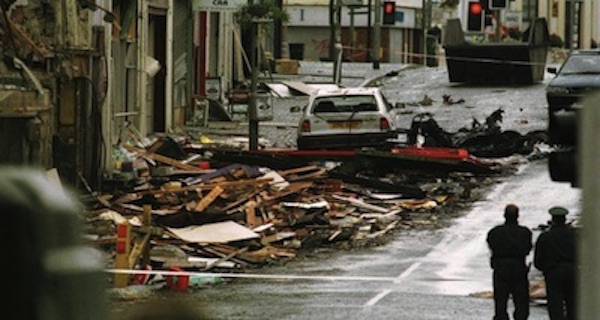
By Jude Collins (judecollins.com)
As children, we all loved a simple tale: Goldilocks v the wolf, Cinderella v the ugly sisters (not very pc, that one), the three little pigs v another wolf. In life, things are rarely that neat.
Take the Omagh bomb. This morning on the BBC Raidio Uladh/Radio Ulster news, the anniversary topped the news headlines. There were tape recordings of breathless news reports at the time, interviews with the loved ones of those killed. The words of Kevin Skelton (married, as it happens, to a remote cousin of mine) still can move even after twenty years. We heard the heartfelt words of a police officer who although off-duty went to the scene to help as best he could.
The victims of Omagh - my home town - are often spoken of as being murdered. There were events that occurred during the Troubles that were indeed murder - that is, the killers set out to and succeeded in killing innocent people. If we consider the pattern of events for some months before Omagh, the signs are that it wasn’t murder: the Real IRA didn’t set out to deliberately slaughter the good and defenceless people they did.
Earlier in August 1998, the Real IRA bombed Banbridge, where they caused extensive damage and injured quite a few people, but killed no one. How could that be? Because they phoned a warning in advance. Their target was commercial, not human.
In Omagh a few weeks later, they also phoned an advance warning. But because, we are told, they misnamed the streets, police shepherded people into the epicentre of the blast, not away from it. So the Real IRA appear to have made the basic mistake of not knowing the street names of the town they were bombing.
But were the Omagh victims not murdered? Ultimately it’s an academic exercise - all those people are in their graves, owing to that bomb. But if you were setting out to murder someone, would you ring up and give advance notice? The Real IRA had in mind to do to Omagh what they did to Banbridge, but they cocked it up. Or someone did.
Because there are stories, not all of them fanciful, that the authorities knew in advance about the Omagh bomb but did nothing. It is certainly true that there were two undercover agents in the Real IRA at the time - David Rupert, an American FBI informer and Paddy Dixon, who procured cars for the Real IRA to transport bombs. Both these men almost certainly knew what was planned and their handlers very likely knew also, but because, presumably, they didn’t want these people’s cover to be blown, nothing was done. The Omagh families of those killed speak of a “starving of intelligence” prior to the bomb being triggered. And so the bomb was brought to Omagh and exploded.
None of this was mentioned in the news coverage on BBC this morning. Instead, they repeated news reports and the agonised testimony of a traumatised Kevin Skelton, and pleas for those who carried out the bombing to come forward and admit their crime. Nothing of the fact that the Real IRA almost certainly did not intend to slaughter over thirty people: even in terms of self-interest, such an event was sure to turn all sympathy away from them, and it did. Behind all this there were the shadowy figures of Rupert and Dixon, who almost certainly knew that a bomb was on its way - as did, in all likelihood, their handlers - but nothing was done to stop it.
The bereaved of Omagh have never been short of sympathy. But they have been starved of truth. And although it’s an academic point, their loved ones were slaughtered but not murdered.
![[Irish Republican News]](https://republican-news.org/graphics/title_gifs/rn.gif)
![[Irish Republican News]](https://republican-news.org/graphics/title_gifs/harp.gif)

